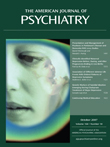Homocysteine and Epigenetic DNA Methylation: A Biological Model for Depression?
To The Editor: In the article by Marshal Folstein, M.D., et al. (1) , published in the June 2007 issue of the Journal , the authors described the homocysteine hypothesis of depression. This study provides a fundamental overview of the current knowledge regarding involvement of the homocysteine metabolism in the pathogenesis of depressive disorders.
Dr. Folstein et al. hypothesized that hyperhomocysteinemia may lead to an elevated risk of depression, mainly via acting as a cerebrovascular risk factor and by causing neurotransmitter deficiency. However, another important pathophysiological mechanism should be taken into account when discussing the homocysteine hypothesis of depression. Homocysteine is metabolized to methionine after activation to S -adenosyl-methionine, which is known to act as a methyldonator. Furthermore, homocysteine itself influences global and gene promoter-specific deoxyribonucleic acid (DNA) methylation (2) . Acute homocysteine treatment has been shown to cause misregulation of different gene-specific promoters and changes of corresponding messenger ribonucleic acid (mRNA) levels (3) . There is growing evidence that altered promoter-DNA methylation permits genome plasticity and adaption to a variety of environmental factors. This may provide the molecular base for a dynamic interaction between the environment and gene expression, regulated by modified promoter methylation. It has been suggested that these molecular mechanisms play a substantial role in the pathogenesis of different psychiatric disorders associated with hyperhomocysteinemia (4) , including schizophrenia, eating disorders, and addiction (2 , 5 , 6) . These epigenetic alterations may directly influence monoaminergic neurotransmission by modifying promoter methylation of candidate genes such as COMT and 5-HTTLPR (6 , 7) . Dysregulation of epigenetic-DNA methylation may therefore be one important element when discussing the homocysteine hypothesis of depression.
1. Folstein M, Liu T, Peter I, Buel J, Arsenault L, Scott T, Qiu WW: The homocysteine hypothesis of depression. Am J Psychiatry 2007; 164:861–867Google Scholar
2. Bleich S, Lenz B, Ziegenbein M, Beutler S, Frieling H, Kornhuber J, Bönsch D: Epigenetic DNA hypermethylation of the HERP gene promoter induces down-regulation of its mRNA expression in patients with alcohol dependence. Alcohol Clin Exp Res 2006; 30:587–591Google Scholar
3. Lenz B, Bleich S, Beutler S, Schlierf B, Schwager K, Reulbach U, Kornhuber J, Bönsch D: Homocysteine regulates expression of HERP by DNA methylation involving the AARE and CREB binding sites. Exp Cell Res 2006; 312:4049–4055Google Scholar
4. Tsankova N, Renthal W, Kumar A, Nestler EJ: Epigenetic regulation in psychiatric disorders. Nat Rev Neurosci 2007; 8:355–367Google Scholar
5. Frieling H, Gozner A, Römer KD, Lenz B, Bönsch D, Wilhelm J, Hillemacher T, de Zwaan M, Kornhuber J, Bleich S: Global DNA hypomethylation and DNA hypermethylation of the alpha synuclein promoter in females with anorexia nervosa. Mol Psychiatry 2007; 12:229–230Google Scholar
6. Abdolmaleky HM, Cheng KH, Faraone SV, Wilcox M, Glatt SJ, Gao F, Smith CL, Shafa R, Aeali B, Carnevale J, Pan H, Papageorgis P, Ponte JF, Sivaraman V, Tsuang MT, Thiagalingam S: Hypomethylation of MB-COMT promoter is a major risk factor for schizophrenia and bipolar disorder. Hum Mol Genet 2006; 15:3132–3145Google Scholar
7. Mill J, Petronis A: Molecular studies of major depressive disorder: the epigenetic perspective. Mol Psychiatry 2007; 12:799–814Google Scholar



